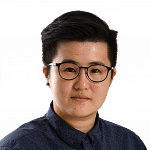Before he retired, Professor Chan Soh Ha, 78, spent up to six hours a day looking at millions of cells through a microscope, hunting for the first signs of a very pervasive form of cancer in patients.
The veteran doctor is known for being spot-on in identifying serum samples of those who might be suffering from nasopharyngeal cancer, which affects the back of the nose, even in the early stages of diagnosis.
For years, he has been looking for someone to take over the reins at his lab, but not everyone is cut out for the job. The challenge of looking at serum samples while bent over the microscope for hours at a stretch has driven many potential proteges away, including an experienced technician who had worked with him for close to three decades.
"It's very tedious work and it strains the eyes," said Prof Chan, who retired in 2016 after more than five decades on the job, adding that it takes between 10 minutes and about half an hour to process one sample.
Now, a team of scientists has succeeded in creating the perfect disciple for Prof Chan using artificial intelligence (AI). The team from Pathnova Laboratories developed a machine learning platform which can replicate his knowledge and can be used for making diagnoses. The AI "takes" what is in Prof Chan's head, and translates it into a computer system that does what he does, said Dr Ian Cheong, the lead researcher.
To accomplish this, the team built a user interface with which Prof Chan viewed thousands of images of serum samples, annotated all the cells that seemed "suspicious" - that could be indicative of nasopharyngeal cancer - and grouped them into different categories.
The thousands of annotations made up a sizeable database that was fed into the AI platform. The entire process took a year to complete.
"Experts like Prof Chan often are experts because they've elevated their craft to an unconscious instinct," said Dr Cheong. "So when we tried to build a system based on enumerated rules, it wasn't to Prof Chan's standards."
The machine learning platform, in comparison, had a concordance rate of about 99 per cent - which means it makes the same diagnosis that Prof Chan does almost every single time. "This system is practically a clone of Prof," said Dr Cheong.
Prof Chan's trained robot might also potentially resolve another problem - manpower.
Dr Cheong noted that there is now a need to screen at least 400,000 people every year in order to significantly increase the detection rate among high-risk individuals, specifically males aged 40 to 60.
On average, Prof Chan goes through about 4,000 patient samples every year. Said Dr Cheong: "It's a huge jump from 4,000 to 400,000. The only way we can get there is via technology."
The team has plans to scale up the system such that it can process up to 2,000 samples in a day.
"And because it's a computer system, it never gets tired. Essentially, we can have as many Prof Chans as we want, to do as many diagnoses as we need."
The team hopes that the system will be fit for population forecasting within the next two years.
There are about 300 new cases of nasopharyngeal cancer every year, according to figures from the Singapore Cancer Registry.


